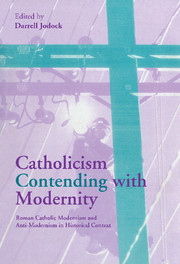 Catholicism Contending with Modernity
Catholicism Contending with Modernity Published online by Cambridge University Press: 30 October 2009
Consalvi, Antonelli, Rampolla: one could write a fascinating and rich history of nineteenth-century Europe through the eyes, and above all the work, of the Vatican's secretaries of state. These ministers helped form foreign policy throughout Europe's various governments, made decisions based on information and the artful gauging of the future's likely course, and worked together with the foreign ministers of secular states to forge a common political course, where possible, to ensure not only peace but above all survival and political stability.
The twentieth century, however, standing in the shadow of 1870 and the demise of the Church State as a meaningful political base for the Vatican's policies, has not been so productive. A history of the Roman Catholic Church in this century, making use of its secretaries of state as a point of departure, would be a thin story indeed. Merry del Val, Gasparri, Pacelli, Casaroli: compared to their counterparts in the preceding century, the achievements are few, if any, the embarrassments many, and the lack of an effective, respected policy, or set of policies, noteworthy. Rather than cooperatively forming the basic guidelines for actual political decisions, and thus events, in Europe and elsewhere, these now almost faceless ministers found themselves trapped by the lack of any stable political power base: the disappearance of the Church State in 1870 led to the bloodletting of the “war” with Bismarck, the draining struggle with France, and the internecine battle over Modernism; in turn, these moments led to this century's straitjacket of the Lateran Treaties and surrender of the German concordat. As Rilke noted in this century's first decade, who speaks these days of victory? Survival is everything.
To save this book to your Kindle, first ensure [email protected] is added to your Approved Personal Document E-mail List under your Personal Document Settings on the Manage Your Content and Devices page of your Amazon account. Then enter the ‘name’ part of your Kindle email address below. Find out more about saving to your Kindle.
Note you can select to save to either the @free.kindle.com or @kindle.com variations. ‘@free.kindle.com’ emails are free but can only be saved to your device when it is connected to wi-fi. ‘@kindle.com’ emails can be delivered even when you are not connected to wi-fi, but note that service fees apply.
Find out more about the Kindle Personal Document Service.
To save content items to your account, please confirm that you agree to abide by our usage policies. If this is the first time you use this feature, you will be asked to authorise Cambridge Core to connect with your account. Find out more about saving content to Dropbox.
To save content items to your account, please confirm that you agree to abide by our usage policies. If this is the first time you use this feature, you will be asked to authorise Cambridge Core to connect with your account. Find out more about saving content to Google Drive.